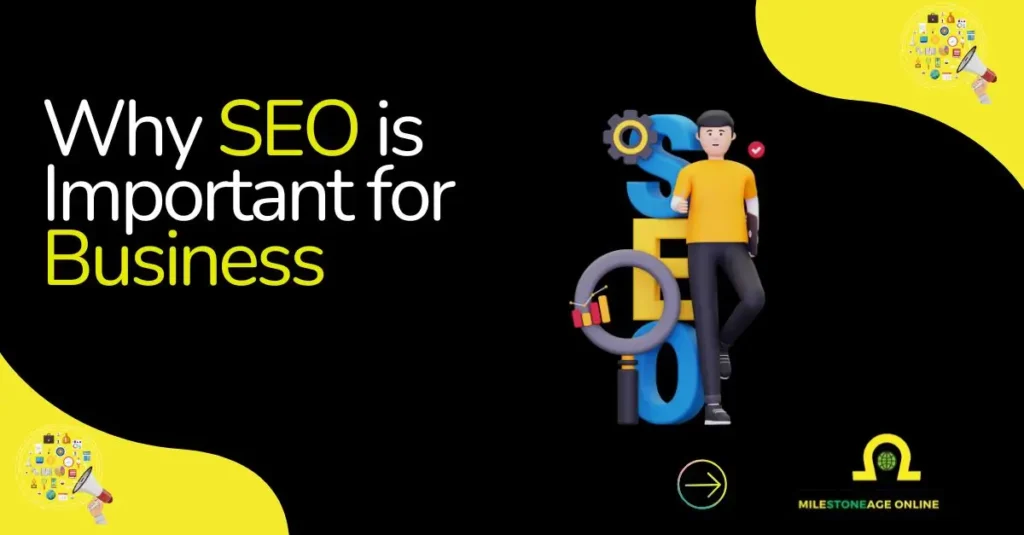SEO (Search Engine Optimization) helps businesses grow by making them more visible online. It builds trust with users and drives steady traffic without relying on ads. To use it, you:
- Improve rankings through technical optimization and quality content.
- Boost trust and brand authority with consistent search presence.
- Gain cost-effective traffic from organic search results.
- Improve user experience with faster, mobile-friendly sites.
- Strengthen credibility through strategic link building.
- Use structured data and entity mapping for AI visibility.
- Apply Generative Engine Optimization (GEO) to appear in AI summaries.
SEO matters because it helps people find your business online. When someone searches for a product or service, they usually click the first few results. If your site appears there, you get more visitors. More visitors can turn into more customers.
It also builds trust, because people see top results as more reliable. Unlike ads, SEO works long term and does not stop when your budget runs out. It also improves your website by making it faster and easier to use. In short, SEO is a smart way to grow your business in today’s digital world.
Why SEO Matters—In Your Business and to AI
SEO makes your business visible to the right people. It also shapes how AI systems read and show your content.
SEO (Search Engine Optimization) makes sure your website can be found easily. It adds trust by placing your content where people expect it. Only the top three Google results capture almost 75% of all clicks.
That means most people never scroll down. Imagine a client, partner, or even investor finding you first because of search. This is why SEO is important for business and why SEO is important for your website.
The importance of SEO in digital marketing is clear. It also guides how platforms like ChatGPT or Google AI Overviews create summaries. SEO builds the base for every other digital strategy.
- Discoverability: SEO lets search engines and AI connect your business with users.
- Credibility: Ranking high adds trust and signals quality.
- AI-readiness: Structured SEO ensures your content appears in AI summaries.
In short, SEO is not just about traffic. It also prepares your brand for the AI-driven future of search.
5 Powerful Reasons Why SEO Is Important for Your Business
SEO gives real traffic and lasting trust. It also saves cost and time.
Boost Visibility & Organic Traffic
Getting seen online depends on search results. Top positions capture almost a third of all clicks. The first three results take nearly 75%. This shows why SEO is important for business. Natural traffic also drives awareness without paying for ads.
- High ranking: Top spots get the most clicks.
- Organic reach: Users find your brand without ads.
- Awareness: Visibility builds steady growth over time.
Strong visibility gives you more chances to grow. This is one of the 10 reasons why SEO is important for business.
Build Brand Credibility & Authority
Trust grows when people see your brand on page one. SEO builds that trust over time by showing your content first. Organic search is often the first choice for careful users. This matters even more in B2B and academic fields.
- Trust factor: Ranking high signals reliability.
- Authority: Search engines reward consistent quality.
- Preference: Many users prefer organic results over ads.
When people see you on top, they believe you more. That trust stays with your brand long term.
Cost-Effective Marketing Engine
SEO works like a smart long-term investment. Paid ads stop when the money stops. SEO keeps bringing results long after setup. This makes it one of the top 5 reasons why SEO is important for business.
- Low cost: SEO is cheaper than ongoing ads.
- Long-term: Content ranks for months or years.
- Compounding: Returns grow as your site improves.
SEO creates lasting impact without draining your budget. Once built, it keeps giving back.
Improve UX & Site Quality
SEO pushes you to build a better website. It makes pages faster, mobile-friendly, and easy to read. This improves how people use your site and how AI ranks it.
- Site speed: Faster sites keep users engaged.
- Mobile-ready: Works across all devices.
- Structure: Clear layout helps both users and AI.
A smooth experience keeps visitors longer. Better UX also tells search engines that your site is worth ranking.
Competitive Edge & Market Reach
Ranking above your rivals means winning more attention. In smaller markets, SEO can even push local sales. Imagine a store in Lahore getting daily leads just from local searches.
- Outperform rivals: Higher rank means more trust.
- Local reach: SEO drives in-person visits and calls.
- Wider market: You appear in more searches.
SEO helps you hold the edge. More reach means more growth opportunities.
Why SEO Is Crucial in Digital Marketing
SEO drives online visibility and supports every digital marketing channel. It also connects people with trusted information before they buy.
SEO is the backbone of digital marketing. It connects with paid ads, social campaigns, and content plans. Almost 90% of online consumers check products before making a purchase. If your site is not visible, they will find your competitor instead. This shows the importance of SEO in digital marketing.
- Brand discovery: SEO puts your business in front of searching customers.
- Cross-channel link: It works with ads, social media, and email marketing.
- Consumer trust: Organic search gives people confidence in your brand.
- Sustained traffic: SEO supports long-term growth while ads give short bursts.
SEO makes sure your brand stands out when customers need it most. It is not just about clicks. It is about being found first and trusted across every digital channel.
Optimizing for AI Overviews: Semantic SEO & GEO
AI-driven summaries change how search results are shown. SEO now needs semantic signals.
Generative Engine Optimization (GEO) means shaping content for AI-driven results. Traditional SEO is no longer enough. AI platforms like ChatGPT and Google overviews depend on structured data and clear answers. This is where semantic SEO steps in. It connects your business with entities that AI understands.
- Structured data: Add schema for products, people, and organizations.
- Clear answers: Write FAQs with simple, direct responses.
- Entity mentions: Use names of tools, brands, and places in context.
- Consistency: Keep your content aligned across web pages and profiles.
Example: A skincare brand lost traffic even with strong SEO. The reason was poor optimization for AI overviews. Competitors with entity-driven SEO appeared in AI summaries instead.
- Practical step: Update pages with schema.org tags.
- Practical step: Add concise FAQ sections to cover common queries.
- Practical step: Use tools like Semrush or Ahrefs as references.
Semantic SEO connects your business with AI. GEO makes sure you are part of AI-generated answers. Together, they shape the future of search visibility.
User Experience & Entity Signals That Make SEO Stick
Good SEO connects with user needs. It also helps AI understand entities.
Search engines now rank based on both content and user experience. Fast, mobile-friendly websites keep people engaged. Data shows almost 30% of users leave slow mobile sites. Local SEO also matters. Nearly 76% of people who search nearby visit a store within a day.
- Fast speed: Quick load times reduce drop-offs.
- Mobile-ready: A site should work on every device.
- Entity mapping: Structured data helps AI link your business with real-world terms.
- Local action: Local searches drive visits and sales.
Why SEO is important for your website is simple. A good user experience and entity-driven content keep you ahead. Together, they secure both search rankings and AI visibility.
Final Takeaway: SEO’s Return On Trust
SEO is more than a way to get clicks. It builds lasting trust, brand presence, and growth. In a digital world shaped by AI, semantic SEO and AI-first strategies decide who gets seen.
The future belongs to businesses that combine quality content, strong technical SEO, smooth user experience, and clear entity signals.
Avoid poor providers and think long term. These are the 5 reasons why SEO is important for business and the 10 benefits of SEO that drive success.
Start refining your SEO today—small steps now secure big wins tomorrow.
FAQs
What is SEO?
SEO is the process of improving websites to rank higher in search results. It drives organic traffic through keywords, user experience, backlinks, and structured data. Today, SEO also supports AI systems like ChatGPT that build answers from content.
Why is SEO important for digital marketing?
SEO is the base of digital marketing. It links content, ads, and social media. Strong SEO lowers customer costs and supports long-term growth by making a brand visible and trusted online.
What are the main benefits of SEO?
Visibility: Higher rankings bring more clicks.
Credibility: People trust organic results.
Traffic: More visitors mean more conversions.
Cost-effectiveness: Cheaper than ongoing ads.
User experience: Faster, mobile-friendly sites.
AI alignment: Structured data helps in AI overviews.
How do I optimize SEO for AI overviews?
Use semantic SEO with structured data for products, people, and services. Add FAQs with direct answers. Mention entities like brands or tools. Keep metadata clear and concise. This Generative Engine Optimization (GEO) helps content appear in AI results.





